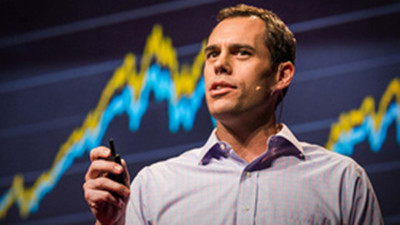It means limiting future risk by minimizing harm to people and planet,
這意味著要通過降低對人和地球的危害,來降低未來的風險。
and it means providing capital to users who deploy it towards productive and sustainable outcomes.
這也意味著向用戶提供資本,使他們用于有益而且具有可持續性的成果。
So if sustainability matters financially today,
如果可持續性影響著今天的財政,
and all signs indicate more tomorrow,
而所有的跡象都表明將來這種影響會更大,
is the private sector paying attention?
那私營部門注意到了嗎?
Well, the really cool thing is that most CEOs are.
很酷的是大多數 CEO都注意到了。

They started to see sustainability not just as important but crucial to business success.
他們開始看到可持續性,不僅重要而且是業務成功的關鍵。
About 80 percent of global CEOs see sustainability as the root to growth in innovation and leading to competitive advantage in their industries.
全球大約 80%的CEO意識到可持續性是創新發展的根本,而且能使他們在同行業中具有競爭優勢。
But 93 percent see ESG as the future,
93%認為ESG是未來的發展趨勢,
or as important to the future of their business.
或者對未來業務發展很重要。
So the views of CEOs are clear.
所以CEO們的意見很明確了,
There's tremendous opportunity in sustainability.
就是在可持續發展方面有巨大的機會。
So how are companies actually leveraging ESG to drive hard business results?
那公司實際上要如何利用 ESG來提高經營效益呢?
One example is near and dear to our hearts.
舉一個和我們最接近的例子。
In 2012, State Street migrated 54 applications to the cloud environment,
2012年,道富集團將54個應用程序遷移到云環境中,
and we retired another 85.
另外還取消了85個。
We virtualized our operating system environments,
我們將操作系統環境虛擬化,
and we completed numerous automation projects.
并且完成了許多自動化項目。
Now these initiatives create a more mobile workplace,
現在這些做法創建了更靈活的工作場所,
and they reduce our real estate footprint,
減少了辦公用地,
and they yield savings of 23 million dollars in operating costs annually,
每年節約了2300萬美金的營運成本,
and avoid the emissions of a 100,000 metric tons of carbon.
減少了100萬噸碳的廢氣排放,
That's the equivalent of taking 21,000 cars off the road.
相當于路上少跑了21,000輛汽車。











